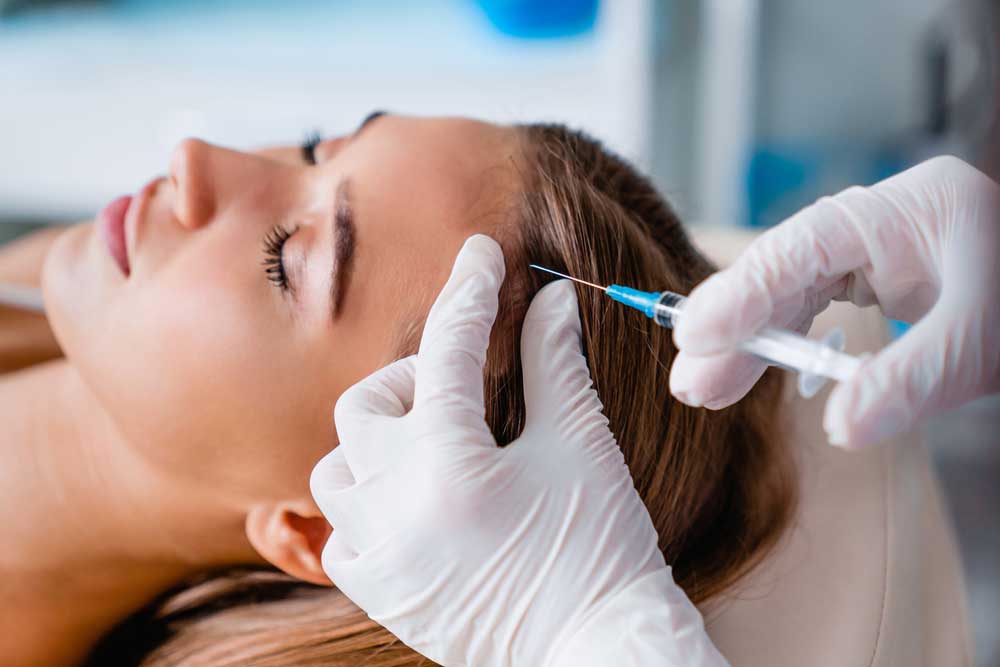Many of us have looked or are looking for ways to stop hair loss and boost hair growth. With hair loss affecting more than 80 million Americans, this is one of the most common health conditions we face and seek to fix. Hair loss can not only affect our confidence but can also be a symptom or side effect of an underlying disease and, therefore, shouldn’t be ignored.
With advancements in medical science, we now have access to numerous hair growth products and methods. However, how many of them are actually effective? One of them that is believed to be a successful hair growth substance is melatonin.
The topical application of Melatonin, a natural sleep hormone, has recently been regarded as a very effective solution for hair loss. To understand how melatonin works for hair loss, it is important to understand what melatonin is and the research conducted worldwide to know the effect of melatonin.
How Does Melatonin Work for Hair Loss?
Hair follicles contain a receiver for the melatonin hormone. Hormones such as adrenaline, testosterone, and DHT are observed and held during sleep while the body generates melatonin. The DHT hormone binds to receptors in our scalp causing retraction of hair follicles. This is where melatonin might work as an antidote to DHT, causing it to unbind from the hair receptors.
During lab tests, many researchers have found this theory of melatonin helping hair follicles regrow to be somewhat true, but how it happens is still a mystery yet to be solved. The most widely accepted theory is that it works on androgenetic alopecia.
Androgenic Alopecia (AGA), or male pattern baldness, is one of the most common hair loss problems in males and females. Various studies have shown that topical melatonin solution causes a reduction in the effects of alopecia and increases anagen hair at the back of the head.
See Also: What Is the Most Common Permanent Treatment for Hair Loss?
Does Melatonin Cause Hair Growth?
Several types of research have been conducted on whether melatonin works for hair loss. In one study, a topical melatonin solution was used for six months by 35 men with AGA. Within three months, 54% of them experienced 29% hair growth, and after six months, 58% of them experienced 42% hair growth.
In another report, researchers found that the melatonin solution was more effective in improving hair loss than previously used products for hair loss problems, respectively.
Over the years, medical experts and dermatologists have believed that if used in minimal quantities, melatonin positively affects men and women with hair loss by reducing the progression and increasing the hair density.
However, it’s important to understand that melatonin is not an absolute solution to hair loss, as its effectiveness is still being researched worldwide. The cause of hair loss varies in different people, and similarly, they experience different results of melatonin. However, it is safe to say that melatonin is considered the best alternative for hair loss with fewer side effects.
Melatonin and Its Benefits for Hair Treatment
Melatonin is an important hormone found naturally in the body that regulates a person’s sleeping and waking cycles. Normally, the supplements of melatonin are designed in labs. Melatonin is commonly used for the treatment of insomnia and to improve sleeping habits and patterns caused by conditions such as jet lag, migraines, and anxiety.
Melatonin and its benefits for hair growth can be understood in two ways:
1. Protection of Hair Follicles
Hair loss is triggered by oxidative stress. Melatonin is a powerful antioxidant that fights oxidative stress. Hair follicles have melatonin receivers, implying that melatonin plays an important role in hair growth. Lab tests show that if used substantially, melatonin extends the growth stage and results in faster growth.
2. Hair Cells Growth
Studies have been conducted worldwide to understand melatonin’s impact on hair growth with androgenic alopecia. The result shows that melatonin increases anagen hair rate in back hair with androgenetic alopecia. For frontal hair, melatonin increases in the group and reduces the effects of alopecia. The back hair with alopecia and the frontal hair counts of those with androgenetic alopecia also increased in the growth phase, though the differences are not influential.
See Also: What Are the Most Common Types of Abnormal Hair Loss Conditions?
How Can I Stimulate Hair Follicles on My Head?
Here are some recommendations that will help to stimulate hair follicles.
- Scalp Massage: Scalp massage is an ideal way to reduce stress and helps in increasing hair follicles.
- Trimming: Taking frequent haircuts helps eliminate split ends that can lose hair’s length, shine, and smoothness.
- Washing hair with cold water: Rinsing hair with cool water helps strengthen hair and prevent oiliness. Therefore, avoiding rinsing hair with hot water will reduce hair fall.
- Avoid chemical products or treatments: Chemical treatments such as bleach or dye can limit hair growth. Cautiously use heat styling products as well.
- Avoid frequent shampooing: Hair follicles repair themselves with natural oils. Therefore, avoid frequent shampooing, as twice or thrice a week is advisable.
Final Takeaway
Hair loss is one of the most common health conditions worldwide, and several reasons can cause it. Baldness due to genetics or aging cannot be prevented. However, there are methods and substances such as melatonin that may help the hair loss problem. Nevertheless, with research still in the initial phase, you should always consult a doctor before using any melatonin or other hair growth product to prevent yourself from dangerous side effects.
Learn More About Melatonin and Other Solutions for Hair Loss at NJHRC
If you are suffering from hair loss and want an immediate solution to your problem, contact us at New Jersey Hair Restoration Center. Our skilled team, led by Dr. Shakov, treats all hair loss problems, including facial hair, with our advanced hair restoration treatment plan. Schedule your consultation today!


